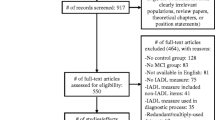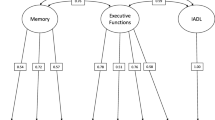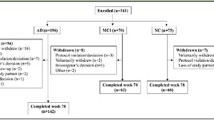Abstract
Mild cognitive impairment (MCI) covers a spectrum of cognitive impairment, bordered by normal cognitive performance on one end and frank dementia on the other. How wide the net for MCI is cast will affect the prevalence and severity of its functional consequences. Many studies suggest that MCI is an early stage of Alzheimer’s disease. Therefore, investigation of the functional impact of MCI offers an important opportunity to examine the quality-of-life impact of a prodromal stage of Alzheimer’s disease. In this review, the authors examine the nosology of the condition, the subjective experience of having an MCI diagnosis, and crosssectional and prospective studies that have examined the topic.
Similar content being viewed by others
References and Recommended Reading
Ritchie K, Artero S, Touchon J: Classification criteria for mild cognitive impairment. Neurology 2001, 56:37–41. This population-based study examined MCI using multiple definitions and showed important differences in prevalence and AD conversion rates between clinic- and community-based samples. The authors suggest that MCI criteria include mild functional deficit.
Peterson RC, Smith GE, Waring SC, et al.: Aging, memory, and mild cognitive impairment. Int Psychogeriatr 1997; 9:65–69.
Peterson RC: Mild cognitive impairment: Transition between aging and Alzheimer’s disease. Neurologia 2000, 15:93–101.
Crook T, Bartus RT, Ferrish SH, et al.: Age-associated memory impairment: proposed diagnostic criteria and measures of clinical change. Report of a National Institute of Mental Health Work Group. Dev Neuropsychol 1986, 2:261–276.
Feher EP, Larrabee GJ, Sudilovsky A, Crook TH: Memory selfreport in Alzheimer’s disease and in age-associated memory impairment. J Geriatr Psychiatry Neurology 1994, 6:58–65.
Levy R: Aging-associated cognitive decline. Int Psychogeriatr 1994, 6:63–68.
Richards M, Touchon J, Ledesert B, Ritchie K: Cognitive decline in aging: are AAMI and AACD distinct entities? Int J Geriatr Psychiatry 1999, 14:534–540. This study compared two alternative definitions of MCI, ageassociated memory impairment (AAMI), and aging-related cognitive decline (AACD) The conditions showed some overlap in this sample, but differences were more impressive, and AACD appeared to be a more coherent clinical entity, as reported by Ritchie [1].
Hughes CP, Berg L, Danziger WL, et al.: A new clinical scale for the staging of dementia. Br J Psychol 1982, 140:566–572.
Morris JC, Storandt M, Miller JP, et al.: Mild cognitive impairment represents early-stage Alzheimer’s disease. Arch Neurol 2001, 58:397–405. Patients meeting criteria for questionable dementia (CDR 0.5) all showed high rates of conversion to AD consistent with their cognitive and functional profile at baseline. Hence, the authors concluded that questionable dementia, at least as defined by CDR 0.5, is a dementia prodrome and not benign aging.
Peterson RC, Smith GE, Waring SC, et al.: Mild cognitive impairment: clinical characterization and outcome. Arch Neurol 1999, 56:303–308. This study proposed a revision and systematization of the original MCI definition (see NIMH workgroup [4]) and has accordingly become the standard definition of MCI.
Wolf H, Grunwald M, Ecke GM, et al.: The prognosis of mild cognitive impairment in the elderly. J Neural Transm 1998, 54:31–50.
Lawton MP, Brody EM. Assessment of old people: Self-maintaining and instrumental activities of daily living. Gerontologist 1969, 9:179–186.
Touchon J, Ritchie K: Prodromal cognitive disorder in Alzheimer’s disease. Int J Geriatr Psychiatry 1999, 14:556–563.
Friedland RP, Fritsch T, Smyth KA, et al.: Patients with Alzheimer’s disease have reduced activities in midlife compared with healthy control-group members. Proc Natl Acad Sci 2001, 98:3440–3445.
Albert SM, Michaels K, Padilla M, et al.: Functional significance of mild cognitive impairment in elderly patients without a dementia diagnosis. Am J Geriatr Psychiatry 1999, 7:213–220. In this study, MCI patients showed greater self- and informantreported impairment than age-matched normal controls. Their profiles were similar to CDR 0.5 patients, supporting Morris’s [6] claim that MCI is a prodome of AD.
Pfeffer RI, Kurosaki CH, Chance JM, Filos S: Measurement of functional activities in older adults in the community. J Gerontology 1982, 37:323–29.
Tabert MH, Albert SM, Borukhova-Milov L, et al.: Informant-versus self-reported functional deficits in patients with mild cognitive impairment predict Alzheimer’s disease at follow-up. Neurology 2002, In review.
Tierney MC, Szalai JP, Snow WG, et al.: Prediction of probable Alzheimer’s disease in memory-impaired patients: a prospective longitudinal study. Neurology 1996, 46, 661–665.
Kluger A, Gianutos JG, Golumb J, et al.: Patterns of motor impairment in normal aging, mild cognitive decline, and early Alzheimer’s disease. J Gerontology Psychol Social Sci 1997, 52:P28-P39.
Honig LS, Mayeux R: Natural history of Alzheimer’s disease. Aging (Milano) 2001, 13:171–182.
Author information
Authors and Affiliations
Rights and permissions
About this article
Cite this article
Albert, S.M., Tabert, M.H., Dienstag, A. et al. The impact of mild cognitive impairment on functional abilities in the elderly. Curr Psychiatry Rep 4, 64–68 (2002). https://doi.org/10.1007/s11920-002-0015-8
Issue Date:
DOI: https://doi.org/10.1007/s11920-002-0015-8




